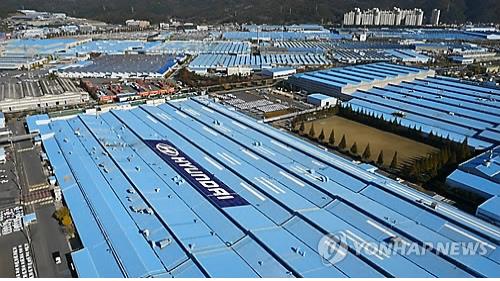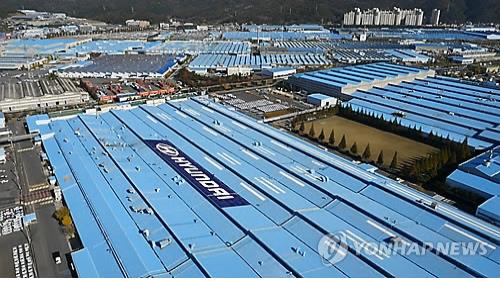SEOUL, June 19 (Yonhap) — Hyundai Motor Co.’s union said Tuesday it will take legal action if the company signs a contract to invest in a local car-manufacturing joint venture proposed by a municipal government.
Hyundai Motor originally planned to sign an agreement with the Gwangju city government on Tuesday to become the second-largest shareholder of the car production JV, which will assemble vehicles under an original equipment manufacturing (OEM) contract.
But the plan was delayed to next month as the mayor of the city government was replaced in the June 13 local elections, a company spokesman said over the phone.
Hyundai’s 51,000-member union will bring the company’s plan to invest about 53 billion won (US$48 million) in the vehicle production JV to court for breach of trust and violation of an existing collective agreement, the union said in a statement.
 This photo shows Hyundai Motor’s plant in Ulsan, South Korea. (Yonhap)
This photo shows Hyundai Motor’s plant in Ulsan, South Korea. (Yonhap)
The Gwangju government has been pushing to build a 700 billion-won car-manufacturing JV with capital of 280 billion won and a loan of 420 billion won and aims to complete the plant by 2020, he said.
Of the 280 billion won capital, Hyundai will foot 53 billion won and the remaining 227 billion won is to be provided by the Gwangju government, making it the biggest shareholder.
Hyundai said it plans to have the plant produce mini cars with 1-liter engines through OEM contracts. The maker of the Sonata sedan and the Santa Fe SUV does not produce mini cars domestically, though it makes similarly sized models, such as the i10 in its overseas plants.
The JV is aimed at generating jobs in Gwangju, which lies 330 kilometers southwest of Seoul, and helping support the local economy. The Gwangju government proposed tax benefits to investors such as a 75 percent reduction in acquisition taxes and another 75 percent cut in income taxes for the first five years, Hyundai said.
The Gwangju government said it plans to pay employees at the plant an annual salary in the mid-30 million-won range, far lower than the average of 90 million won for workers at Hyundai plants. Hyundai expects to produce vehicles at low cost in the OEM plant.
As the vehicles produced at Hyundai’s plants cannot be transferred for production to other plants without approval from the union, only new models can be built at the OEM plant, Hyundai said.
Hyundai’s union, on the other hand, said it is against the company’s OEM production move, stressing the carmaker has extra production capacity.
The combined output capacity of Hyundai and its affiliate Kia Motors Corp. stands at 9.68 million vehicles, while their total sales reached 7.35 million autos in global markets last year.
“The company has ample leeway to assemble vehicles in its existing plants and there is no need to look elsewhere,” the union said.
(END)
